Estimated reading time: 7 minutes
For thousands of years, one of humanity's greatest struggles has been preserving food. Everyone has to eat to live, so countless people have spent much of their lives in the production and processing of food. Through the years, people have tried a variety of methods including salting, smoking, fermenting, pickling, canning, drying, and freezing. Some of these methods were obviously easier, more reliable, and better for you and your taste buds.
One of the best methods is drying or dehydrating. It preserves food by simply removing the water. Bacteria, mold, and yeasts cannot grow in dry environments. It’s probably the oldest method of preserving food, but in the past, it wasn't used by people living in humid areas. High humidity can prevent food from drying properly without smoking it or using some of today’s handy technology.
Thankfully, there are now many methods to dehydrate food right in your home. Some are cheaper and more efficient than others, but no matter how you dehydrate food, there are a ton of benefits.
Want to save this post for later? Click Here to Pin It On Pinterest!
1. Dehydrated Food is Lightweight, Portable, and Takes Up Little Space
It’s perfect for camping trips and survival situations. Unlike frozen food, it doesn’t require a constant energy source to keep from spoiling. You can take it anywhere no matter what the outside temperature is.
Also, because you’re taking out all the water when you dehydrate food, it becomes lighter and smaller, especially when compared to canned foods which can be a hassle to transport. This is exactly why nomadic people of the past often dried their food.
2. Food Can Be Dehydrated Without Using Any Energy
You may choose to use an electric dehydrator, but during the summer months when most produce is available anyway, solar dehydrators are a great option. Using a solar dehydrator is one of the only methods of food preservation that can be done without any energy.
During the colder seasons, you can dehydrate food on top of an already available heat source such as a wood stove or radiator. Be careful and look up DIY plans before trying either of these methods.
3. There’s a Surprising Amount of Food That Can Be Dehydrated Easily and Safely
Some foods just either aren’t good or aren’t safe when canned, frozen, or fermented. However most foods can be dehydrated, and dried food tastes good and comes with little risk. You’re much better off preserving foods like watermelon, wild mushrooms, and herbs in a dehydrator than you would be canning or freezing them.
4. There Are No Added Ingredients
Preserving your own food using any method can cut a lot of unhealthy ingredients from your diet. You’ll feel good knowing you’re not getting preservatives, artificial colors, or artificial flavors when you eat food you put up at home. However, some preservation methods still need added ingredients to be effective.
A lot of canning recipes require ingredients like vinegar, sugar, and salt to preserve food. While they serve their purpose and can be tasty, often dehydrated food is the healthier option. Why pressure can corn with salt when it can be dried all by itself? You even have to add salt to ferment many foods!
Smoking is also less healthy than dehydrating as smoke contains carcinogens that get into your food. While you’re fine eating smoked foods in small amounts, it should not be your main method of food preservation.
5. It Reduces Waste
Unlike canned foods, dehydrated foods can be stored in anything that’s airtight. There’s no running to the store to buy new jar lids or rings. You can recycle almost any container to store your dried food.
You’re also less likely to waste food if you use a dehydrator. First of all, any food that is near spoiling can be thrown into a dehydrator with little effort or forethought. Secondly, if you have a large jar of dehydrated food, let’s say peppers, you can open it and take a few out for a meal without needing to use up the whole jar before it spoils like you would with canned peppers.
6. Dehydrated Food is Nutrient Rich
Whenever you can food, it has to be heated in the jar for quite a while in order to be safely preserved. This heating process destroys some of the foods' nutrients like fiber and vitamin C. Frozen food is better than canned food.
However, most frozen food has to be heated in a process called blanching before freezing to stop the action of enzymes that affect the color, taste, and nutrient content of the food. Dehydrated food, on the other hand, just loses water in the drying process and retains all of its nutrients.
7. Dehydrating Food is Really Easy
Yes, dehydrating food takes a lot of time, but not time that you have to directly put in. Once your food is processed and in the dehydrator, you can walk away for hours. For example, if you want to preserve apples, you can cut them up and toss them in the dehydrator or you can them.
Canning requires you to peel, chop, and heat them in liquid before packing them into jars you had to sanitize. Then you have to stay with them while they boil in the canner and then wait overnight to see if your jars sealed. Dehydrating skips almost all of that process!
8. You Can Make Healthy Snacks
If you’re a person who always wants something to munch on, dehydrated food is the way to go. There are many fruits and vegetables that are tasty dehydrated. Foods like tomatoes, apples, and peaches are great to eat without rehydrating.
You can also dehydrate foods specifically with snacking in mind. Fruit leathers and kale chips are healthy options that are easy to dehydrate yourself.
9. It’s Great for Instant Meals
Most dehydrated foods can be quickly rehydrated when simmered in a little water or broth, making them ideal for meals on hectic days. It’s also possible to make products like instant rice simply by cooking it part way and then dehydrating it so that when you’re ready to use it, its cook time will be far less.
10. Dehydrated Food Makes Great Gifts
It’s a great way to share some of your harvest with your family and friends. Dehydrated fruits are an excellent idea because they can be enjoyed as is. For the more adventurous people in your life, you may even try dehydrating a whole meal for their next backpacking trip.
As an added bonus, mailing dehydrated food to distant friends and relatives is a much easier and cheaper way to share your produce than mailing a bunch of canned goods.
11. Dehydrating Food Can Help You Prepare for Hardship
Everyone is facing changing times politically, economically, and environmentally. In a world with little certainty, you want to be prepared in whatever way you can. Whether there’s a natural disaster or you lose your job, having food on hand can make your life much easier when things get tough.
Dehydrating food can quickly and cheaply provide you with a lot of stored food. Dried food will last about a year in sealed bags or containers and will last indefinitely if you vacuum seal it.
Conclusion
No matter why you’re preserving food or where you got it from, there are definite benefits to dehydrating. It can help you make the most of your harvest, reduce your family’s waste, provide you with delicious snacks, and even stock your house with portable emergency food. What have you tried dehydrating?
Like this post? Don't Forget to Pin It On Pinterest!



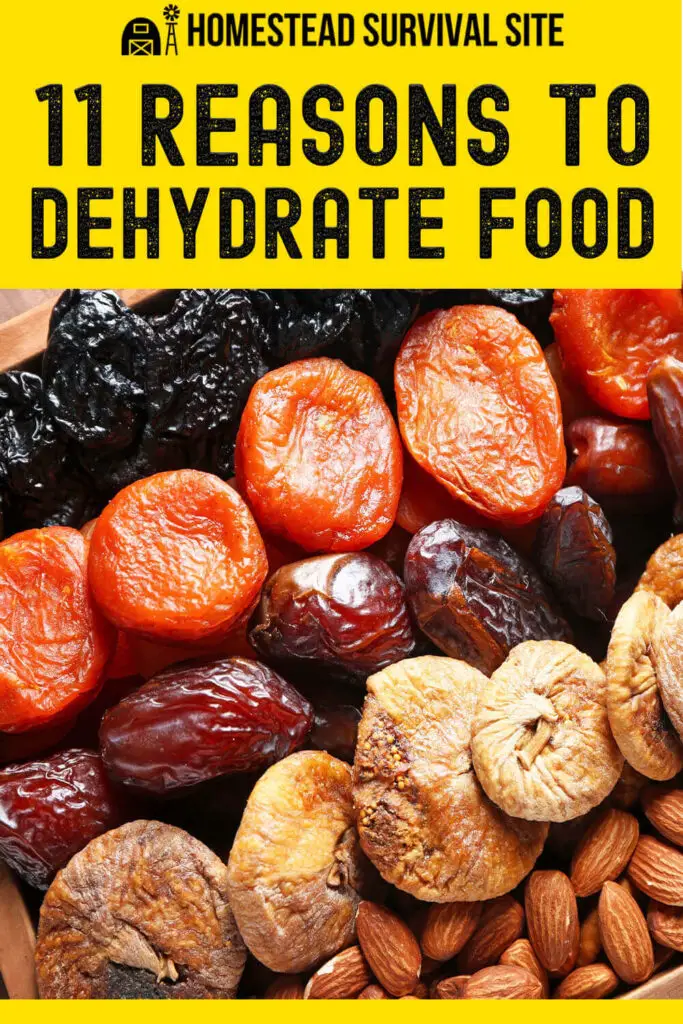

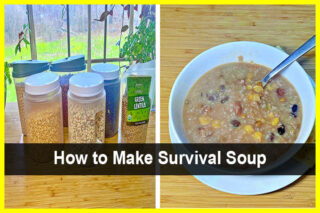
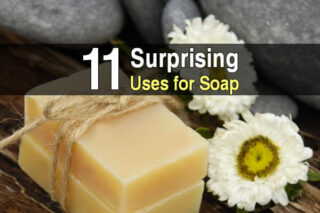

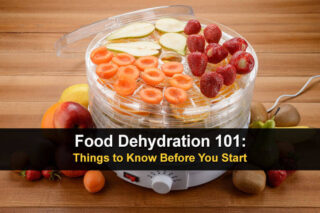
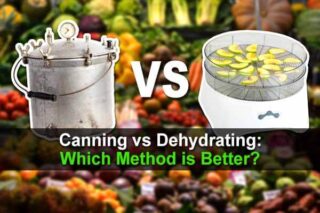
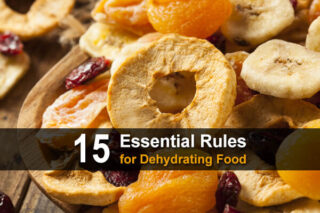

Every year I take ripe figs off the tree wash, then slice them as thin as possible, put them in the dehydrator and they are like candy when the are dehtdrated
A relative sent me 1.5kg dried cranberries which I have not yet opened. Do I still have to dehydrate them to prolong their shelf life?